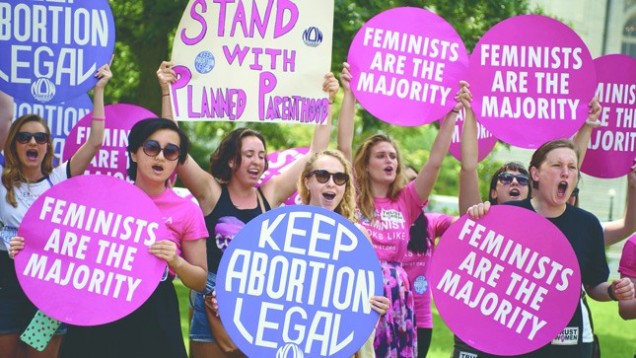Category: Budget & Appropriations
With Obamacare in peril, the Governors Speak Out
Before the Affordable Care Act (ACA), I did not have health insurance. My home state Florida did not mandate health insurance coverage for residents and my undergraduate university did not require me to have health insurance. In essence, I was a typical American in my early 20s. I did not think I needed health insurance, was not required to carry it, and could not afford it. Cost was the greatest factor: I did not have any income and Florida did not expand Medicaid. To my surprise, the ACA allowed me to have affordable health insurance for the first time as an adult. Now Congress is contemplating major changes to the ACA (or commonly called Obamacare), causing some governors, such as Charlie Baker (R-Massachusetts), to weigh in on the proposals. Despite the recent successful House repeal and replacement of the ACA, the Senate is now struggling to find a path forward under the budget reconciliation rules.
Just a few months ago, it looked as though changes to the ACA were inevitable given the unified Republican control of Congress and the Administration. Despite seven years of discussion of repeal, and more recently the repeal and replace vote, the future is still uncertain. Members of Congress who attended town hall meetings during the 4th of July break heard from many constituents who are deeply concerned with loss of coverage. Former House Speaker John Boehner recently said that Congress would not repeal and replace, but instead “fix” Obamacare. And now, the Senate is spinning its wheels.
The much-awaited House bill, the American Healthcare Act (the “AHCA”), was the first attempt at replacing the ACA. The AHCA would repeal tax penalties for people without health insurance, reduce federal insurance standards, cut subsidies for buying private insurance and establish new limits on spending for Medicaid. In their first attempt, Republicans failed to get their bill to reach the House floor for a vote. In spite of this defeat, the Trump Administration placed renewed pressure on Congress to revise the ACA. Ultimately, the House was able to pass the bill in its second try by adding $8 billion to help cover insurance costs for people with pre-existing conditions. However, the Senate cannot pass the House bill because Majority Leader McConnell must accommodate Republican senators from states that have expanded Medicaid under the ACA. These senators, with a statewide constituency, must consider what their state governors have to say on revisions to the ACA.
Congress’ ACA replacement process included a request to the 50 governors for information. In response, Massachusetts Governor Baker sent a letter on the ACA’s impact on Massachusetts. Some commentators believe Governor Baker’s letter could carry extra weight because of his Republican party affiliation and his past work experience as chief executive of Harvard Pilgrim Health Care gives his suggestions and concerns greater authority.
In his letter, Governor Baker discussed the importance of the health sector to the Massachusetts economy; $19.77 billion, making it one of the leading industries in the state. Governor Baker also noted that the ACA was modeled after the Massachusetts system, which was intended to provide close to universal coverage for residents. Massachusetts has the highest percentage of insured residents in the U.S.— 96.4%. Just under 60% of the insured are covered through the employer-sponsored insurance market.
Governor Baker argued that lawmakers should not repeal the ACA, but revise it. One area in need of repair is the ability of individuals with employer provided insurance to switch to tax-payer subsidized health insurance; something half a million Massachusetts residents have done since 2011. As a result, Medicaid now accounts for close to 40% of the state’s budget. Since 2012, the percentage of Massachusetts residents on commercial insurance decreased by 7% while Medicaid enrollment increased by 7% and now insures 28% of the population. The original Massachusetts program did not allow this transfer, but the State was forced to comply with the introduction of the ACA. Now, this particular aspect of the ACA was straining the Massachusetts system and needed to be revised. Although Governor Baker offered reforms, he argued for maintaining several aspects of the law, such as the mandate requiring all residents to carry health insurance, which would allow stability within high-risk pools for insuring people who are sick.
The Governor continues to push the goal of universal health care coverage, but recognized such a goal was in jeopardy because of certain Congressional proposals. For instance, the letter expressed concern over a shift to block grants for Medicaid funding to the states. The Governor argues that a shift to block grants (or “per capita caps for Medicaid) would “remove flexibility from states” as the result of lower federal funding. Under current law, the federal government and state governments share in the financing and administration of Medicaid. According to the Congressional Budget Office, states typically pay health care providers for services to enrollees, and the federal government reimburses states for a percentage of their expenditures. Furthermore, all federal reimbursement for medical services is “open-ended” in other words, if a state spends more because enrollment increases or costs per enrollee rise, additional the federal government matches. Currently, Massachusetts is a 50/50 state, meaning that the federal government and Massachusetts divide the cost of providing health care for Medicaid recipients.
Despite Governor Baker position, the House passed AHCA creates a per capita-based cap on Medicaid payments for medical assistance. The per-capita caps would establish a limit on the amount of reimbursement the federal government provides to states. For instance, if a state spent more than the federally established limit on reimbursements, the federal government would not match the additional costs. The AHCA would punish Massachusetts low income residents and threaten the stability of the MassHealth system. Consequently, the changes to federal grants of funds could impact the Commonwealth’s goal of universal healthcare.
Today, Governor Baker—joined with nine other governors, including Gov. Sandoval (R-Nevada) and Gov. Kasich (R-Ohio) —sent another letter to the Senate urging it to correct the ACA’s weaknesses without repealing the law or gutting Medicaid. The Governors wrote, “lasting reforms can only be achieved in an open, bipartisan fashion.” The governors also called on the Senate to heed U.S. Sen. John McCain’s, R-Arizona, impassioned plea to return to “regular order” and not continue the recent practice of hyper partisanship.
The governors are speaking; the question remains whether Congress is listening.
 Juan Garay graduated from Boston University School of Law in 2017.
Juan Garay graduated from Boston University School of Law in 2017.
Planned Parenthood’s Terrible, Horrible, No-Good, Very Bad Year
The past 12 months was not the best of years for Planned Parenthood. In July 2015, a video surfaced of a Planned Parenthood employee discussing prices on harvested tissues from fetuses aborted by clinic patients. Planned Parenthood and other health care providers regularly act as a middleman - obtaining fetus tissue from consenting women and ensuring it safely reaches the proper research facilities. For this, the providers are usually reimbursed by research facilities for the costs of the process, but are not legally allowed to profit from the service.
Instantly the video caused an uproar within the GOP and prompted many political figures to point fingers at the organization for what it saw as illegal, greedy and immoral practices. Prominent Republican legislators, such as Ted Cruz, demanded that the organization be immediately stripped of over 500 million dollars in annual federal funding. During the Republican nomination process, Presidential hopefuls like Carly Fiorini used precious debate time to make wild accusations about the contents of the video and wilder claims that the “vast majority of Americans” support defunding Planned Parenthood.
Despite this misinformation, Planned Parenthood faced even more trouble when Congress took up the issue of the federal budget in September. The early fall saw Congress in a heated showdown, with Republicans fighting tooth and nail to attach an amendment to the budget that would defund Planned Parenthood as punishment for its “illegal” actions. On September 18, 2015, House Republicans were able to win the vote to defund the health care provider for one year. As the October 1st deadline to pass a federal budget approached, it was important that arguments over this bill not cause a repeat of the government shutdown of 2013. Fortunately, Senate Democrats worked hard to filibuster the amendment and the legislation failed to pass.
This small relief was short-lived however, as the organization faced a violent shooting at a Colorado branch in late November. The shooting has even caused some to speculate that the recent media scrutiny and criticism of the organization may have played a role in the attacker’s motivation to commit the act in the first place. Many of the conservative politicians lambasting Planned Parenthood seem to be attempting to ride the anti-abortion movement, claiming the organization provides solely abortion services in this country. To the contrary, the abortion services provided by Planned Parenthood accounted for only 3% of its services in 2013. And federal funding for abortion is restricted to cases of rape, incest or endangerment to the life of the mother by the Hyde Amendment.
Despite this, Senate Republicans passed the bill recently defunding Planned Parenthood and repealing parts of the Affordable Care Act. To do this, they relied on the Congressional reconciliation process, which only requires 51 votes to pass legislation. The bill passed 52-48.These votes are largely symbolic “political posturing” though, as President Obama has promised to veto any bill that touches the ACA or Planned Parenthood in any negative way.
Although the organization has faced a tough year, it has mobilized many supporters’ nationally, whether in person or through Facebook profile picture filters. The presidential election is bringing the debate into stark relief, with obvious pro-life and pro-choice platforms on either side. Trump has said that he plans to defund Planned Parenthood if they continue to perform abortions, although he actually supports the other services the organization provides. His choice in Mike Pence as a running mate speaks volumes as well. Pence has been working diligently since 2007 to defund Planned Parenthood, with some minor success. As the governor of Indiana, he has severely cut state funding to the organization. On the other hand, the 2016 Democratic National Convention hosted Planned Parenthood’s president Cecile Richards. Richards was clear in her speech when stating, "Make no mistake: women's health and rights are on the line and on the ballot in this election.”
Hopefully the next 12 months will bring better tidings for an organization that aims (and is known) to provide affordable and essential health care services to thousands upon thousands of men, women, and children in low-income families in America – people who otherwise would not be able to receive proper health care at all. The presidential elections could be a death toll or a saving grace for an organization on the precipice. Come November, the future of Planned Parenthood will be more certain. Until then, the organization holds its breath.
 Sonam Bhagat is from Lowell, Massachusetts and graduated from Boston College in 2011, concentrating in Finance and Accounting. Sonam is expected to matriculate from Boston University School of Law in 2017. Sonam will be working for a large corporate law firm in the summer of 2016 and hopes to explore various areas of law, in order to better decide her course after graduation.
Sonam Bhagat is from Lowell, Massachusetts and graduated from Boston College in 2011, concentrating in Finance and Accounting. Sonam is expected to matriculate from Boston University School of Law in 2017. Sonam will be working for a large corporate law firm in the summer of 2016 and hopes to explore various areas of law, in order to better decide her course after graduation.
Unconstitutional Budget Cuts – the Illinois Pension Controversy
Across the country, state governments are facing financial crises and seeking to devise effective ways of saving costs. In Illinois, lawmakers have recently found themselves in conflict with the Illinois Supreme Court over a 2013 budget-related pension reform law. On May 8, 2015, the Court found the law unconstitutional, compelling legislators to go back to the drawing board and find alternative means of balancing the budget.
With the aim to reduce expenditures, the 2012-2013 Legislature passed “An act concerning public employee benefits,” meant to address “atypically large debts and structural budgetary imbalances” and an extremely low—and potentially falling— credit rating. Also, the state’s public pension system was considered the most underfunded of any in the United States. The General Assembly expressed hope that the Act would “lead to fiscal stability for the State and its pension systems.” The key provisions of the Act were:
1) terminate automatic, compounded annual cost-of-living increases for retired persons;
2) increase the retirement age for current public employees; and
3) reduce the salary amount that can be used for the calculation of pension benefits.
The Illinois State Constitution, however, includes specific pension provisions for public employees; Article 13, Section 5 describes the pensions in Illinois as a binding contract "which shall not be diminished or impaired.”
Various employee groups, retirees, and unions challenged the Act by asserting their constitutional rights. The Illinois Retired Teachers Association sued first in December, 2013, with a labor coalition named We Are One joining in the litigation a month later. The labor coalition boasted over 621,000 members, including: the Service Employees International Union (SEIU) Local 73, the Illinois AFL-CIO, the Illinois Federation of Teachers, the Illinois Nurses Association, the Illinois Police Benevolent and Protective Association, the Associated Fire Fighters of Illinois, and others. The We Are One complaint asserted that the Act violated the Illinois Constitution’s Pensions Clause and resulted in "an unconstitutional diminishment and impairment of the pension amount a member receives,” as well as violations of the Constitution’s Contracts Clause and Takings Clause.
After the Illinois Circuit Court found the pension law to be unconstitutional, the State appealed to the Illinois Supreme Court. Several amicus curae, including those submitted by professors specializing in constitutional and contract law, social service providers and the City of Chicago, supported the law and argued in favor of its legitimacy. Like the state, they argued the state’s sovereign police power enabled it to reduce the pension benefits as a way of addressing the current budget emergency.
The Illinois Supreme Court, however, unanimously voted to strike down the pension reform law. The court found that the Act violated the Pension Clause despite the financial difficulty placed upon the state with the public pension program:
“For as long as there have been public pension systems in Illinois, there has been tension between the government’s responsibility for funding those systems, on the one hand, and the costs of supporting governmental programs and providing governmental services, on the other.” Nevertheless, the court firmly concluded that the law was unconstitutional, writing that “there is simply no way that the annuity reduction provisions in Public Act 98-599 can be reconciled with the rights and protections established by the people of Illinois when they ratified the Illinois Constitution of 1970 and its pension protection clause.”
The court was also unconvinced by the State’s primary affirmative defense – that the pension reform law was a valid exercise of the State’s police power in a state of emergency. Citing the cyclical nature of the economy, the Court asserted that the State has faced fiscal struggle before and cannot lower or terminate expenditures that the Illinois Constitution protects. As one potential alternative, lawmakers have submitted legislation to confront the state debt by amending the Illinois Municipal Code. This law would allow cities in Illinois to file Chapter 9 bankruptcy petitions under the national Bankruptcy Code.
The Illinois pension reform controversy may hold an important lesson for other legislatures struggling to balance the budget, especially since six other states have constitutional protections for public pensions. If the Illinois Supreme Court’s decision is any indication of how other state courts might react, legislators would be advised to keep state constitutionality in mind when developing budget-related bills; the judiciary will likely not be receptive to economic arguments when used as justification for violating an unambiguous constitutional clause. Facing such provisions, lawmakers may ultimately be drawn to amending the state constitution as a strategy, which Illinois Governor Rauner reportedly plans to pursue in the next year.
 Chloe Noonan is from Monterey, California and graduated from Sarah Lawrence College with concentrations in Modern Languages and International Studies. She anticipates graduating from Boston University School of Law with a Juris Doctor in Spring 2016. During Summer 2015, Chloe will intern at the Lawyers’ Committee for Better Housing in Chicago, Illinois, where she plans to focus on affordable housing preservation and eviction defense for low-income tenants.
Chloe Noonan is from Monterey, California and graduated from Sarah Lawrence College with concentrations in Modern Languages and International Studies. She anticipates graduating from Boston University School of Law with a Juris Doctor in Spring 2016. During Summer 2015, Chloe will intern at the Lawyers’ Committee for Better Housing in Chicago, Illinois, where she plans to focus on affordable housing preservation and eviction defense for low-income tenants.


